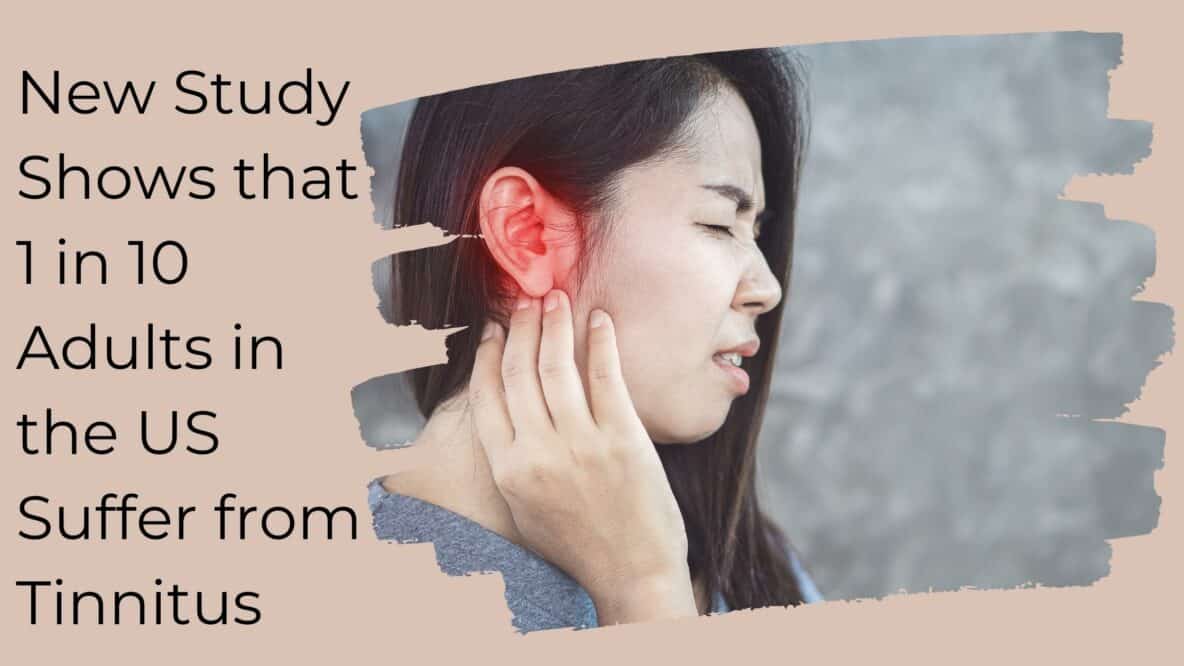You are likely a little familiar with tinnitus. Have you ever left a loud and busy environment like a noisy restaurant, concert, or party and noticed a ringing-like noise in your ears? This unpleasant noise may have made it temporarily difficult to hear clearly as sounds were muffled or unclear. This is tinnitus – the experience of hearing a specific sound in one or both ears when no external noise is present in your environment which means that it is coming from your ears.
This phantom-like noise is often described as a ringing, buzzing, or clicking noise that can range in its loudness. Tinnitus can become disruptive to daily life when it is constant, preventing people from sleeping, focusing, and completing tasks. Tinnitus is more common than you may think. A recent study conducted by researchers at the University of California Irvine (UCI) shows that 1 in 10 adults in the U.S. experience tinnitus.
What causes tinnitus?
Tinnitus is not a condition itself but a symptom of an underlying medical condition. Because numerous health conditions can produce tinnitus as a symptom, it can often be difficult to diagnose. The American Tinnitus Association estimates that nearly 200 medical conditions can trigger tinnitus. A few common causes of tinnitus are:
- Hearing loss: the most common cause of tinnitus is hearing loss – the third most prevalent chronic medical condition people that people experience today. Hearing loss affects over 48 million people of all ages in the U.S. It can be caused by several factors including exposure to loud noise, aging, and existing medical conditions like diabetes and heart disease.
Hearing loss often results from damaged hair cells in the inner ear. These cells are sensory receptors that send sound information to the brain which further processes the sound we hear. Damaged hair cells reduce the capacity to detect and process incoming sound waves which creates various symptoms like tinnitus. The Hearing Health Foundation estimates that 90% of all tinnitus cases occur with underlying hearing loss.
- Ear infections: infections in the ears can produce inflammation and fluid accumulation behind the eardrum and this blockage can trigger tinnitus.
- Ototoxic medications: this describes medications that contain ingredients that have a toxic impact on the ear (cells, nerves, blood flow, etc.). Various types of medications can trigger tinnitus: specific types of antibiotics, non-steroidal anti-inflammatory drugs like aspirin and ibuprofen, anxiety medications, and allergy medications.
- Head injuries: extreme force to the head and traumatic brain injuries can also damage hair cells in the inner ear. These delicate cells can lose sensitivity and die over time, preventing them from sending sound information to the brain. This can result in hearing loss as well as tinnitus.
Tinnitus can also be triggered by growths and obstructions in the ears, autoimmune conditions, and inner ear disorders.
How common is tinnitus?
To assess how common tinnitus is, researchers at UCI analyzed data from a national survey that included 75,764 people who were 18 years and older. Published in JAMA Otolaryngology-Head & Neck Surgery, this study found that:
- 1 in 10 people experience tinnitus in the past 12 months
- 36% of people dealt with chronic tinnitus
- 27% experienced tinnitus for more than 15 years
- Only 49.4% of people had discussed their tinnitus with a physician
In addition to these findings, the Centers for Disease Control and Prevention (CDC) estimate that 50 million people experience tinnitus and 20 million people live with chronic tinnitus. These statistics illuminate that tinnitus is much more common than most people assume.
How is tinnitus managed?
If unmanaged, tinnitus can be debilitating. It can prevent quality sleep, increase irritability, make concentrating impossible, and heighten stress. But there are useful ways you can alleviate tinnitus and the impact it has on your life. Useful strategies include:
- Treat hearing loss: if you experience tinnitus, be sure to have your hearing tested. Hearing tests are painless and are used to measure hearing capacity in both ears. The most common treatment for hearing loss is hearing aids which provide significant support with detecting and processing sound. Hearing aids alleviate symptoms including tinnitus and even come with tinnitus masking features.
- Tinnitus retraining therapy: your hearing healthcare specialist could also recommend tinnitus retraining therapy which is a type of sound therapy that involves retraining the brain to interpret tinnitus as mundane background noise.
- Use a sound machine: creating ambient noise can mask tinnitus. You can do this by using white noise machines or playing soft sounds in the background.
To learn more about how you can effectively manage tinnitus, contact us to schedule an appointment to have your symptoms assessed.

